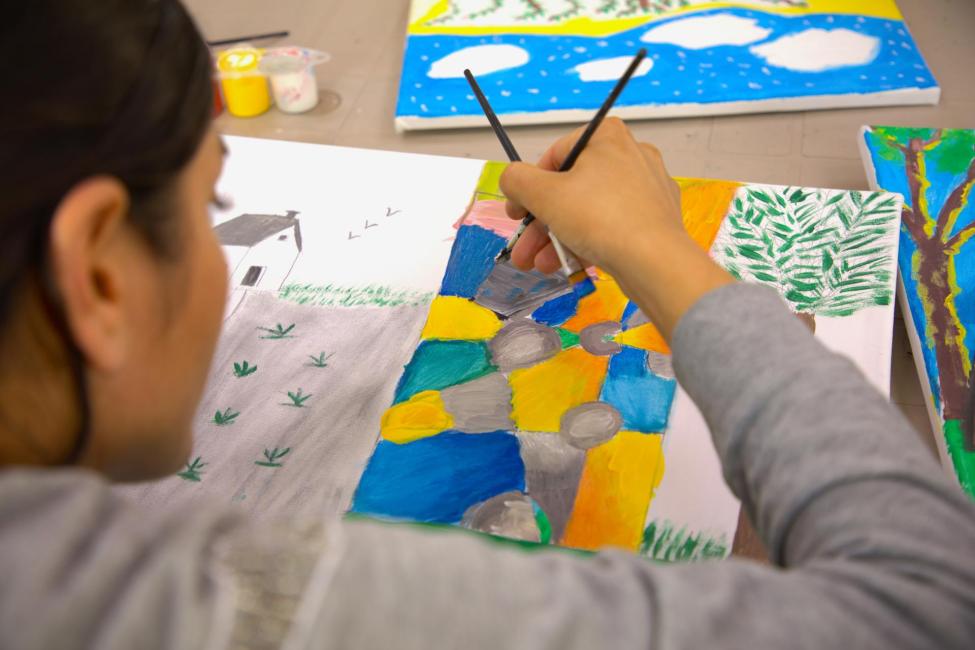-
Who We Are
WHO WE AREThe International Organization for Migration (IOM) is part of the United Nations System as the leading inter-governmental organization promoting since 1951 humane and orderly migration for the benefit of all, with 175 member states and a presence in over 100 countries. IOM has had a presence in Iraq since 2003.
About
About
IOM Global
IOM Global
-
Our Work
Our WorkAs the leading inter-governmental organization promoting since 1951 humane and orderly migration, IOM plays a key role to support the achievement of the 2030 Agenda through different areas of intervention that connect both humanitarian assistance and sustainable development. Across Iraq, IOM provides a comprehensive response to the humanitarian needs of migrants, internally displaced persons, returnees and host communities.
Cross-cutting (Global)
Cross-cutting (Global)
- Data and Resources
- Take Action
- 2030 Agenda
On World Mental Health Day, paint, draw and sketch a new world with internally displaced persons in Iraq
IRAQ, Duhok – In the camps of Khanke and Sharya, in northern Iraq, a remarkable transformation has begun among a group of internally displaced Yezidi women and girls. These young individuals, whose lives have been disrupted by conflict and displacement over seven years ago, have found solace and hope in the world of art through an IOM course on art therapy. Their drawings, paintings and stories are a testament to the power of creativity and resilience.
“Initially, drawing was just my hobby,” shares 16-year-old Nadia* from Sharya camp for internally displaced persons (IDPs), “but that was before I learned about the art therapy course”. Nadia, with dreams of capturing the beauty of seascapes, is one of the first participants of IOM’s pilot course on art therapy for vulnerable populations in the IDP camps of northern Iraq. She explored the world of art through shadows, light, facial features, and the harmonious blending of colors. This newfound understanding helped her convey the depths of her emotions through art.
"Gradually, my drawing style developed, and I learned the correct method and steps,” she shares after the two-week course. “I didn't know how to draw a face at all, where to start, and where to end”. Many others in the course have similar stories and yearn for more time to nurture their artistic talents. One of them is Nadia’s friend, Nisreen*.
“As I learned how to blend colors, I also learned about expressing my emotions through art,” shares Nisreen, inspired by Frida Kahlo's emotional artistry, and aspires to follow in her footsteps. She is now on a journey of self-discovery through her art, one that she hopes to share with the world someday as an artist and an art teacher.
Behind these stories and new interest in art, is a concerted effort by IOM Iraq to provide positive coping mechanisms and healthy outlets for emotional wellbeing in complex and protracted displacement settings. Interspersed with color theory, shapes, lines and forms; the course encourages participants to express their emotions through paintings and drawings, while providing a safe space for discussions and learning.
Some participants found the activity a welcome distraction; while others have found a new skill to explore and communicate their feelings. For Sama*, 23, the course gave her a new perspective, connecting art to mathematics via Cubism.
“I am now teaching my younger brothers how to draw eyes through geometric shapes and angles,” Nisreen shares. “Together, we played with light and shadow on still life objects. It was a fun bonding experience.”
IOM Iraq provides protection services such as specialized case management, awareness-raising sessions and recreational activities within the safe spaces in both camps in Duhok. In 2023, IOM has provided over 450 protection services, including recreational activities to 118 individuals. The provision of recreational activities, such as the course on art therapy plays a role in reducing stress, boosting self-esteem, and encouraging emotional expression. They also create safe spaces for individuals to connect and build networks within their community, and act as non-stigmatized and safe access points to other protection services.
These activities were supported with the contribution of USAID - Bureau for Humanitarian Assistance under the ‘Integrated humanitarian multi-sector assistance to Internally Displaced Persons (IDPs) in Iraq’ project.






